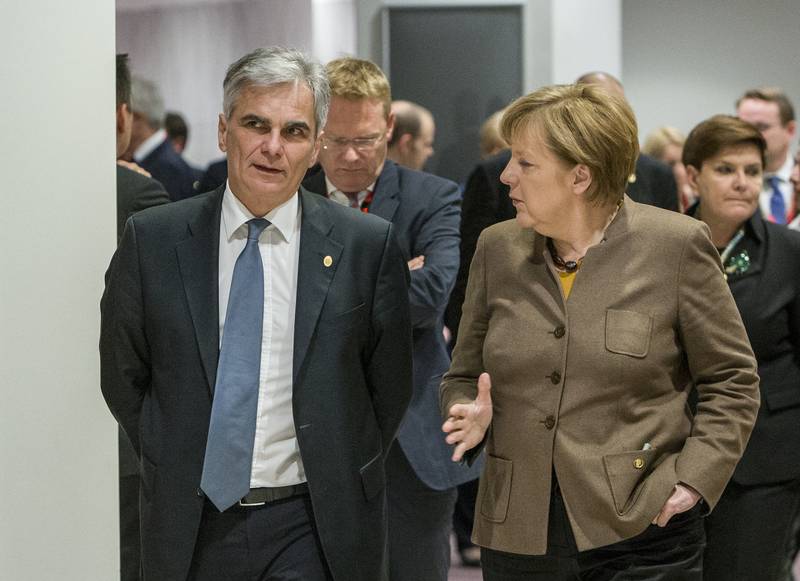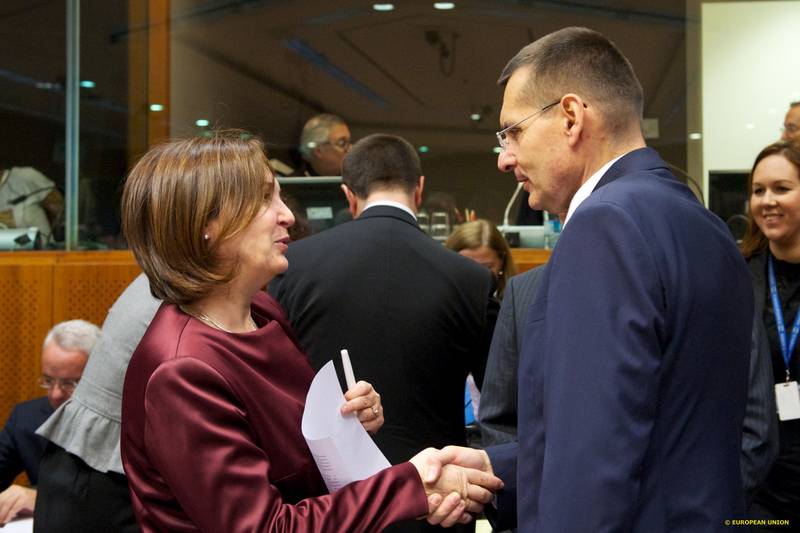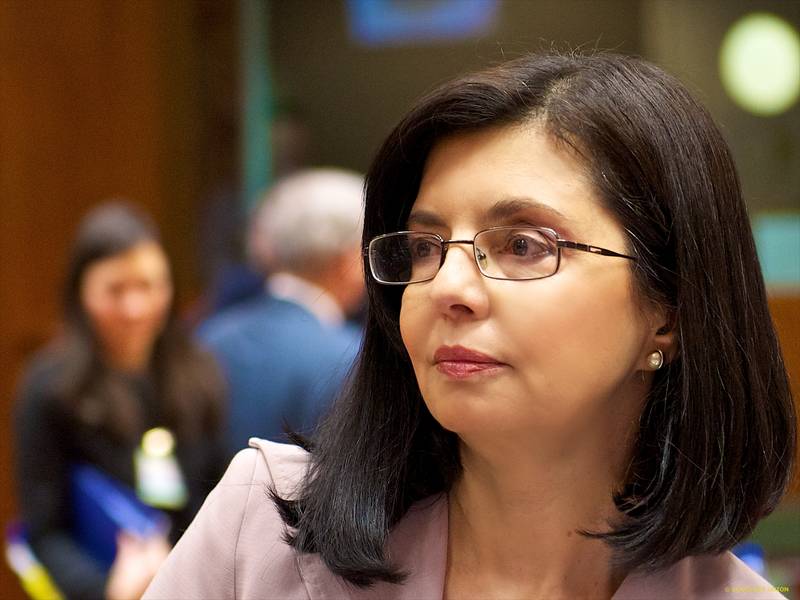Schengen - solidarity is also a responsibility
Adelina Marini, May 11, 2011
 To have solidarity and to be tolerant, while at the same time being responsible and unappeasable with the rule of law. Sounds simple but it's not, as it appears. This was shown also by the hearing in the European Parliament of European Commission President Jose Manuel Barroso and Internal Affairs Commissioner Cecilia Malmstrom on the latest Communication of the Commission, aimed at reforming Schengen legislation. On the one hand everyone is unanimous that EU external borders are a common problem, but on the other - there are weaknesses in some countries that harm others. And the even bigger problem is that, in spite of the decades long efforts to achieve economic convergence in the European Union, it is still not a fact, which makes some EU countries more attractive for immigration to others.
To have solidarity and to be tolerant, while at the same time being responsible and unappeasable with the rule of law. Sounds simple but it's not, as it appears. This was shown also by the hearing in the European Parliament of European Commission President Jose Manuel Barroso and Internal Affairs Commissioner Cecilia Malmstrom on the latest Communication of the Commission, aimed at reforming Schengen legislation. On the one hand everyone is unanimous that EU external borders are a common problem, but on the other - there are weaknesses in some countries that harm others. And the even bigger problem is that, in spite of the decades long efforts to achieve economic convergence in the European Union, it is still not a fact, which makes some EU countries more attractive for immigration to others.
For the representatives of the European institutions during the debate - the Presidency and the Commission - it was important to outline the common European approach when tackling Europe's problems. Hungarian Minister of European Affairs,  Eniko Gyori said that reforming security and governance of Schengen in a moment of a strong immigration pressure is risky and underlined that a long-term strategy was needed. The mechanism for temporary reinstating of borders should be used indeed as a last resort measure, she added.
Eniko Gyori said that reforming security and governance of Schengen in a moment of a strong immigration pressure is risky and underlined that a long-term strategy was needed. The mechanism for temporary reinstating of borders should be used indeed as a last resort measure, she added.
European Commission President Jose Manuel Barroso spoke vehemently before the MEPs. He emotionally said yet in the very beginning, by even diverting a bit from his prepared speech, that he remembered very well the problems that existed in his home country - Portugal - even for a trip to neighbouring Spain, thus underpinning what a mistake it would be to reinstate border control. This statement of his caused strong applause in the plenary: "I still remember in my country when going from Portugal to Spain there were a lot of difficulties".
Further on he explained that free movement was essential for growth and jobs. Moreover, "free movement is to Europe as foundations are to a building. Remove it and the whole structure is undermined", which was also applauded by the MEPs. In fact, the basic idea of Mr Barroso's statement was to defend the Commission's Communication to strengthen border control and Schengen's governance. He several times underlined that the Commission's ideas were not directed at finding ways for Member States to re-introduce border controls. "I firmly believe that to do so would catastrophically undermine not just what Europe has constructed over the last 61 years, but to sabotage the viability of our efforts to build a prosperous and integrated Europe for the future".
 Mr Barroso's statement, however, as well as the Commission's Communication, were heavily criticised by the MEPs. Those who defended the re-introduction of border control were a minority. Several MEPs, among which leaders of groups, raised the issue that 20,000 refugees from Tunisia are a problem for Tunisia not for the EU at large. According to Martin Schulz, leader of the Progressive Alliance of Socialists and Democrats (PASD), 20,000 leaving Tunisia were a crisis for Tunisia but not for Europe. "If we undertake appropriate measures of solidarity, this would not be a problem". He, though, attacked the Commission that instead of explaining to Italy and France that unilateral measures were harmful, it came up with a communication against one of Europe's greatest achievements - the free movement of people.
Mr Barroso's statement, however, as well as the Commission's Communication, were heavily criticised by the MEPs. Those who defended the re-introduction of border control were a minority. Several MEPs, among which leaders of groups, raised the issue that 20,000 refugees from Tunisia are a problem for Tunisia not for the EU at large. According to Martin Schulz, leader of the Progressive Alliance of Socialists and Democrats (PASD), 20,000 leaving Tunisia were a crisis for Tunisia but not for Europe. "If we undertake appropriate measures of solidarity, this would not be a problem". He, though, attacked the Commission that instead of explaining to Italy and France that unilateral measures were harmful, it came up with a communication against one of Europe's greatest achievements - the free movement of people.
The leader of the Alliance of Liberals and Democrats for Europe (ALDE), Guy  Verhofstadt, was also blunt and said that Italy's decision to hand over temporary residence permits was a shame, as well as the reaction of France to reinstate borders. "This was a ping pong game by two governments on the back of refugees who were in fact in trouble", the former prime minister of Belgium said and was applauded vehemently in the plenary.
Verhofstadt, was also blunt and said that Italy's decision to hand over temporary residence permits was a shame, as well as the reaction of France to reinstate borders. "This was a ping pong game by two governments on the back of refugees who were in fact in trouble", the former prime minister of Belgium said and was applauded vehemently in the plenary.
However, there were voices that refugees could not be considered only through the prism of victims of conflicts and that it would be good to find a mechanism that would make a distinction between economic immigrants and refugees. As if the feeling that no radical reform of the Schengen legislation was prevailing. Many MEPs said that just a change of the approach, when applying the law, would be sufficient.
As a representative of the probably most affected, for years, country which is an EU external border - Malta - Simon Busuttil (EPP) recalled that two were the lessons from the current crisis. The first is that the internal borders within Schengen depend on a common strategy and that, indeed, external borders should be a common concern. The second lesson, in his words, is that Schengen needs solidarity which also means responsibility and burden sharing. He reminded to those for whom 20,000 Tunisians were not a problem that it depended on size. For a country like Malta, with a population of 400,000 people, even a thousand refugees is a lot. His opinion is that the Dublin Regulation has to be changed.
It stipulates that refugees must be returned to the country of origin, the country where they have entered the EU from. Malta is the southernmost border of the EU and from there a lot of immigrants pass, bound for better life and work in the EU.
Voices were heard that Schengen should in fact be reformed in order to respond to the new realities. Like other issues, related to EU legislation, here too was said that Schengen was created and meant for 5 member countries. Currently they are much more, while two more are pending accession.
 By the way, Bulgaria and Romania were mentioned several times during the hearing, including by the Maltese MEP, according to whom Bulgaria and Romania had done a lot of work and should not become victims of the current situation. Manfred Weber, also from the European People's Party said that Bulgaria and Romania should be accepted if they applied the standards. The Bulgarian MEP from the majority, Andrey Kovachev, also joined the debate, reiterating again the position of Bulgaria that no new requirements should be put forward for the two countries.
By the way, Bulgaria and Romania were mentioned several times during the hearing, including by the Maltese MEP, according to whom Bulgaria and Romania had done a lot of work and should not become victims of the current situation. Manfred Weber, also from the European People's Party said that Bulgaria and Romania should be accepted if they applied the standards. The Bulgarian MEP from the majority, Andrey Kovachev, also joined the debate, reiterating again the position of Bulgaria that no new requirements should be put forward for the two countries.
He asked to know when Sofia and Bucharest would join, since they had already implemented the technical criteria. During a public discussion in Sofia on may 9th, Dr Kovachev commented: "Of course, there is no problem if member states decide that for a certain period of time border control must be reinstated at a particular border  crossing. This will not be a drama if it is coordinated and if it is not a unilateral action of one or another government, which has some internal problems to solve through their elevation at European level".
crossing. This will not be a drama if it is coordinated and if it is not a unilateral action of one or another government, which has some internal problems to solve through their elevation at European level".
During the entire debate, however, could be felt the thread of solidarity, bend through responsibility. And this is precisely the key to solving the problem, because, if rules are not applied, whatever they are will not bring any success. Something which Bulgaria should know very well. In the same time, though, things look differently through the eyes of voters and taxpayers. For example, on Saturday near the Eiffel tower there were several groups that caused the arrival of the police amid the wonderful summer day. Two of the groups were Romanian Roma who were arguing with each other. The third group seemed to be immigrants from North Africa.
 No matter what the problem was, the common feeling of the thousands of tourists around was not that much of curiosity but rather of discomfort with the situation. It is not excluded some of the people around to have thought that President Nicolas Sarkozy was right to send back hundreds of Romanian Roma (some tens of Bulgarian as well) to their home countries. In this sense was the statement of British MEP Nigel Farage from the UK Independent Party (UKIP). He attacked President Barroso for calling extremists and populists those who want to control their borders and who listen to the fears of their voters.
No matter what the problem was, the common feeling of the thousands of tourists around was not that much of curiosity but rather of discomfort with the situation. It is not excluded some of the people around to have thought that President Nicolas Sarkozy was right to send back hundreds of Romanian Roma (some tens of Bulgarian as well) to their home countries. In this sense was the statement of British MEP Nigel Farage from the UK Independent Party (UKIP). He attacked President Barroso for calling extremists and populists those who want to control their borders and who listen to the fears of their voters.
Across the Atlantic ocean
In fact the debate about the refugees, as it became clear from the discussion in Parliament, is very much related to economy. At a time when one after another countries with generous welfare systems fall in disgrace in the eyes of international creditors and also need to be shown solidarity with in the name of the single European currency, they too have to pay for the refugees. This is why several MEPs called, when solving the problem with immigration, the demographic situation in the member states to be also taken into account.
Such a focus had the speech of President Barack Obama about immigration. "Our nation is the leader of the global economy in part because of the steady stream of hardworking and talented people who have come to our country in search of a better life for themselves and their families. As we continue to strengthen our economy, we need an immigration system that demands responsibility and accountability from government, businesses and immigrants themselves", according to the speech.
The key is "hardworking and talented people", the expectations about whom are for them to contribute to the economy. An aspect, which Europe still has a lot to think about before undertaking the most appropriate actions.
 Werner Faymann, Angela Merkel | © Council of the EU
Werner Faymann, Angela Merkel | © Council of the EU Rumyana Bachvarova, Petre Toba | © Council of the EU
Rumyana Bachvarova, Petre Toba | © Council of the EU Meglena Kuneva | © Council of the EU
Meglena Kuneva | © Council of the EU | © European Parliament
| © European Parliament | © The Council of the European Union
| © The Council of the European Union | © European Parliament
| © European Parliament